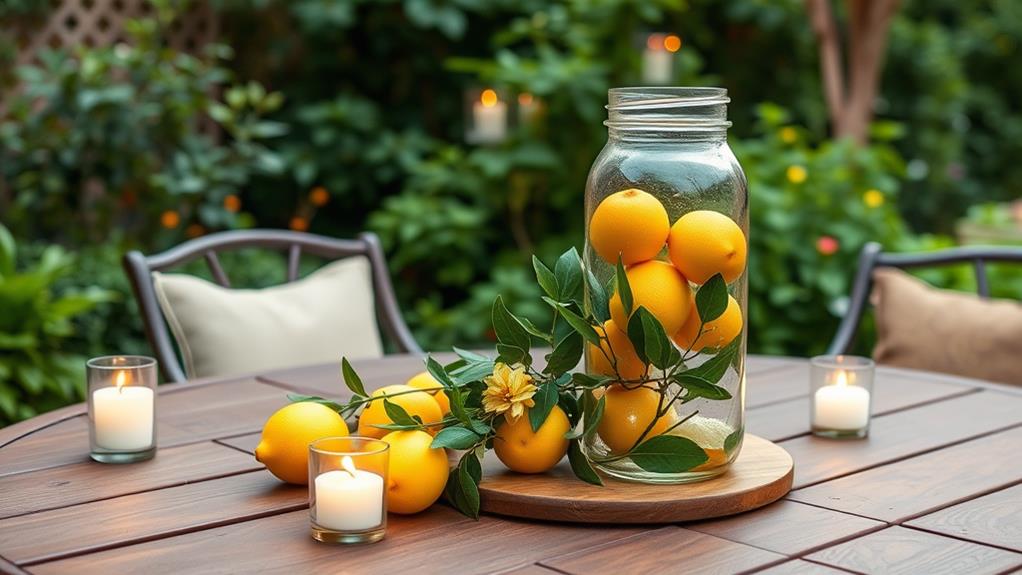As the warmer months approach, many of us are keen to enjoy the outdoors without the nuisance of mosquitoes. While chemical-based repellents are often the go-to solution, there are several effective and eco-friendly alternatives to consider. From cleverly utilizing fans and citronella candles to tapping into the power of essential oils and garlic, the possibilities for natural mosquito repellents are vast. But which methods are most effective, and how can you easily incorporate them into your daily life? Examine these 10 innovative ideas to uncover a mosquito-free haven that’s both safe and sustainable.
Use a Fan to Repel Mosquitoes
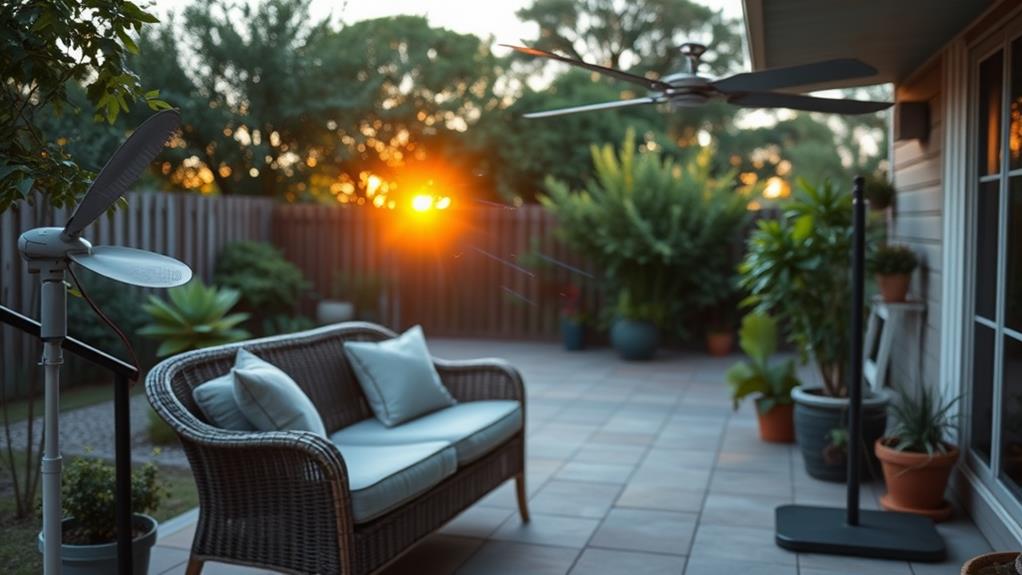
When it comes to repelling mosquitoes, one of the simplest and most effective methods is to use a fan.
Mosquitoes are not strong fliers, so a gentle breeze from a small fan can help keep them away. Position a fan in front of a doorway to prevent mosquitoes from entering your house, or place one near outdoor seating areas to keep them at bay.
Fans can be an effective and chemical-free way to repel mosquitoes, and they can likewise improve air circulation, making outdoor spaces more comfortable.
This innovative approach is a great addition to your mosquito-repelling arsenal, providing a convenient and eco-friendly solution to keep these annoying insects at bay.
Citronella Candles for Outdoor Spaces
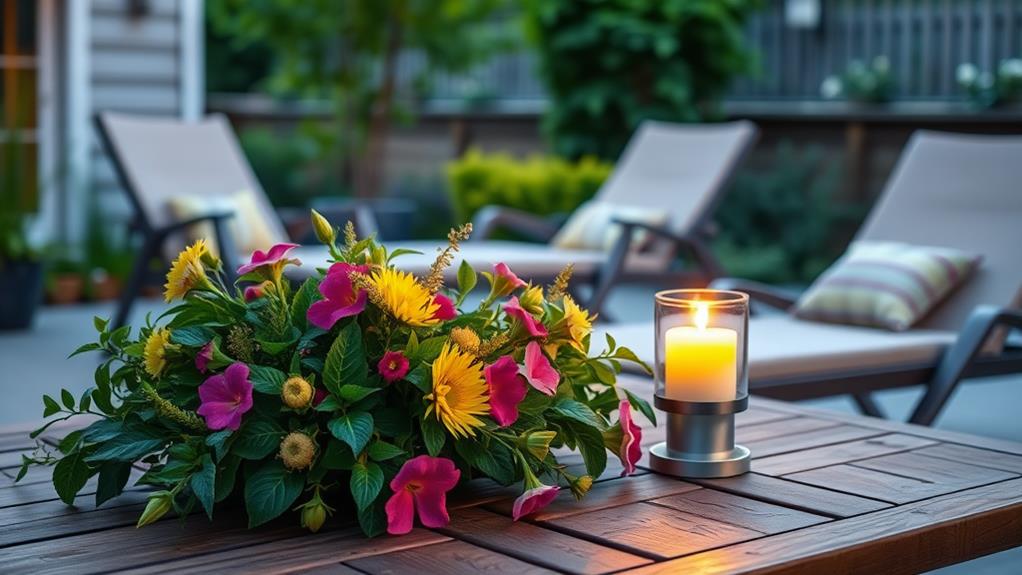
Set the mood for your outdoor gatherings with citronella candles, a popular and effective way to keep biting insects at bay. These candles release a fragrant smoke that confuses mosquitoes, making it difficult for them to locate their targets.
| Benefits | Features | Tips |
|---|---|---|
| Ambiance | Available in various scents | Place them strategically |
| Insect repellent | Smoke confuses mosquitoes | Avoid windy areas |
| Easy to use | Simply light and enjoy | Trim wick for better burn |
| Portable | Take them to outdoor events | Store in a dry place |
| Affordable | Compare prices online | Combine with other methods |
Mosquito Coils for Backyard Protection
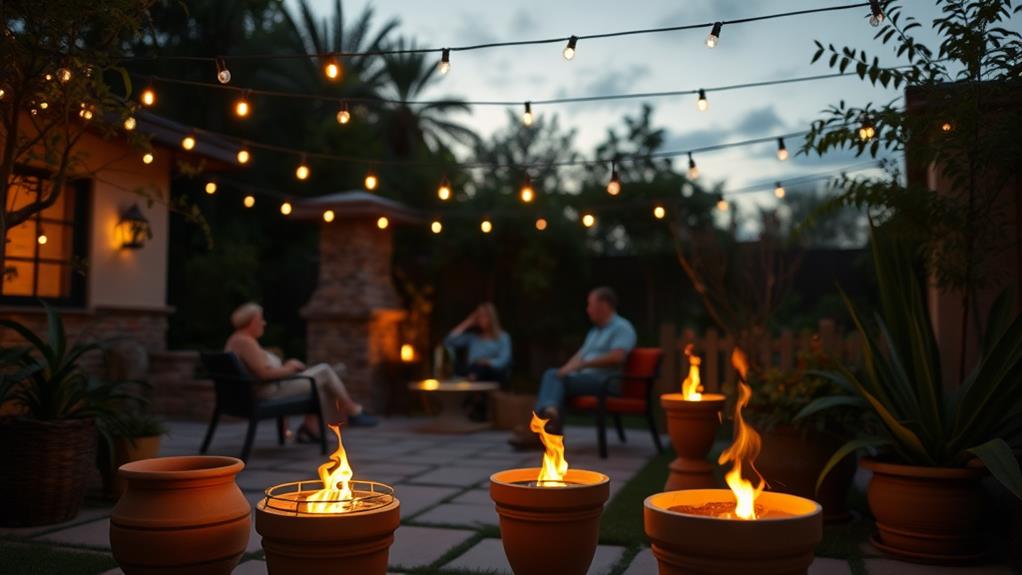
Outdoor gatherings can be a real challenge when mosquitoes are present, ruining the atmosphere and making it difficult to enjoy quality time with friends and family.
One effective solution to this problem is using mosquito coils for backyard protection. These coils are made of a powder that has been combined with a chemical repellent, which is then lit and smolders to release a chemical vapor in the air.
This vapor helps to repel mosquitoes, making it possible to enjoy outdoor gatherings without the nuisance of these biting insects.
- Mosquito coils can be an effective way to keep mosquitoes away, but they’re not safe to use indoors.
- Be sure to follow the instructions on the packaging and keep them away from pets and children.
- Mosquito coils can be used in combination with other repellent methods, such as citronella candles and essential oils, for added protection.
- They are a popular and convenient way to enjoy outdoor spaces without the bother of mosquitoes.
Yellow Lights to Deter Mosquitoes
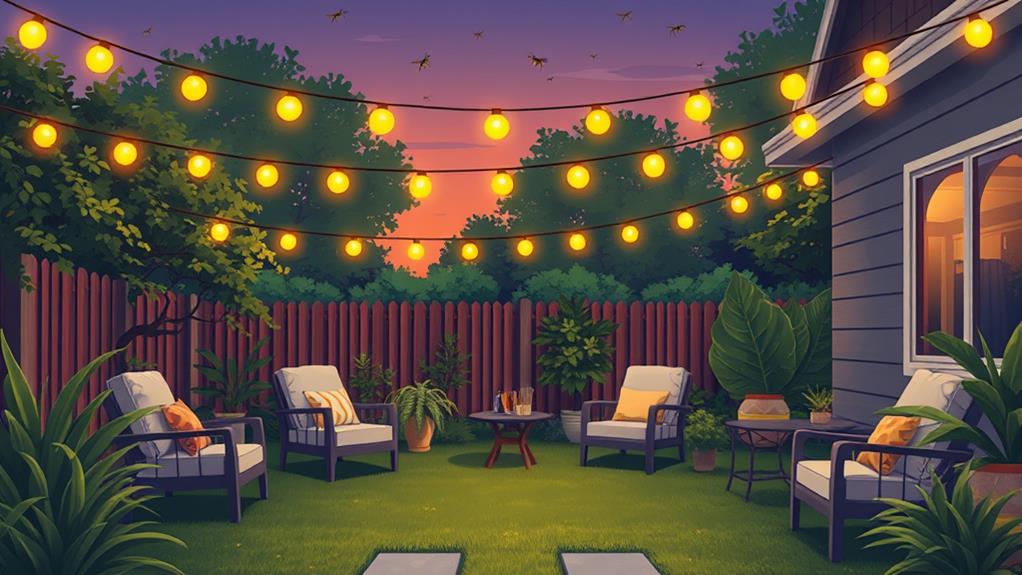
Mosquitoes are notorious for their attraction to light, but did you know that certain types of lighting can actually help deter them?
Yellow lights, in particular, are a simple and effective way to repel mosquitoes. Unlike white lights, which attract mosquitoes, yellow lights are less appealing to these annoying insects.
You can install yellow bug lights around your outdoor spaces, such as patios or decks, to keep mosquitoes at bay. This is a great alternative to using chemical-based repellents or citronella candles. Plus, yellow lights can add a warm ambiance to your outdoor spaces, making them perfect for summer gatherings or relaxation.
Essential Oils as Natural Repellents
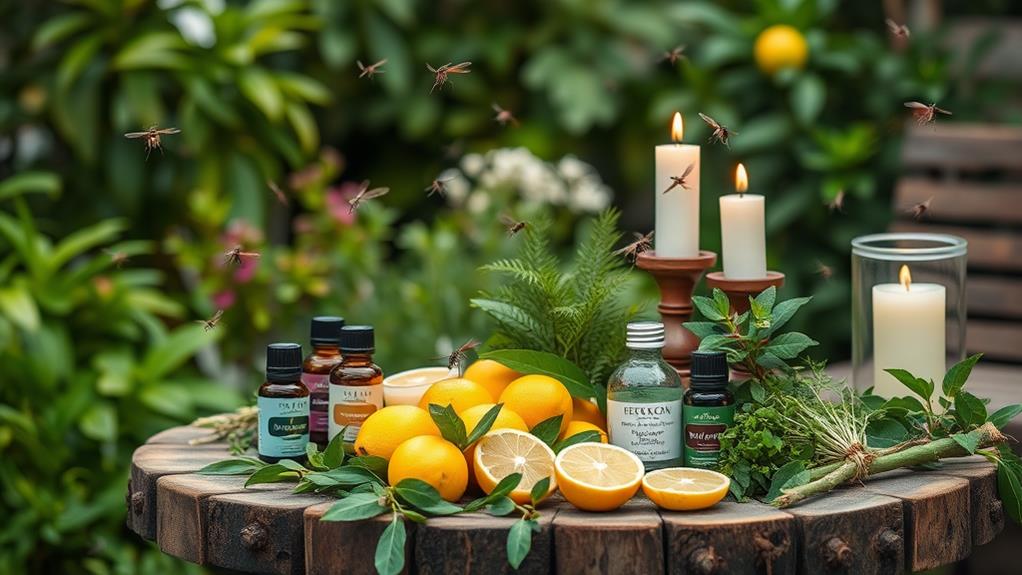
In conjunction with utilizing yellow lights to deter mosquitoes, another effective approach to repel these annoying insects is to harness the power of essential oils.
Certain essential oils have natural properties that can repel mosquitoes, providing a chemical-free alternative to commercial repellents.
- Lemon eucalyptus oil is a popular choice, as it contains citronellal, a compound that repels mosquitoes.
- Citronella oil is another effective option, with its strong citrus scent keeping mosquitoes at bay.
- Lavender oil, known for its calming properties, likewise has a surprising effect on mosquitoes, repelling them with its sweet aroma.
- Peppermint oil, with its refreshing scent, can likewise be used to repel mosquitoes, making it a great addition to your outdoor spaces.
DIY Mosquito Repellent Sprays

Six simple ingredients can be combined to create a potent DIY mosquito repellent spray, providing a convenient and cost-effective alternative to commercial products.
By mixing essential oils like citronella, eucalyptus, and lemongrass with a carrier oil like olive or coconut oil, you can create a natural repellent that’s effective against mosquitoes.
Add witch hazel or vodka as a base for your spray, and you’ll have a powerful tool to keep mosquitoes at bay.
This DIY spray is perfect for outdoor activities, picnics, or backyard gatherings.
Simply shake well before use and apply as needed.
With this easy-to-make spray, you’ll be enjoying mosquito-free moments in no time.
Mosquito Traps for Your Yard
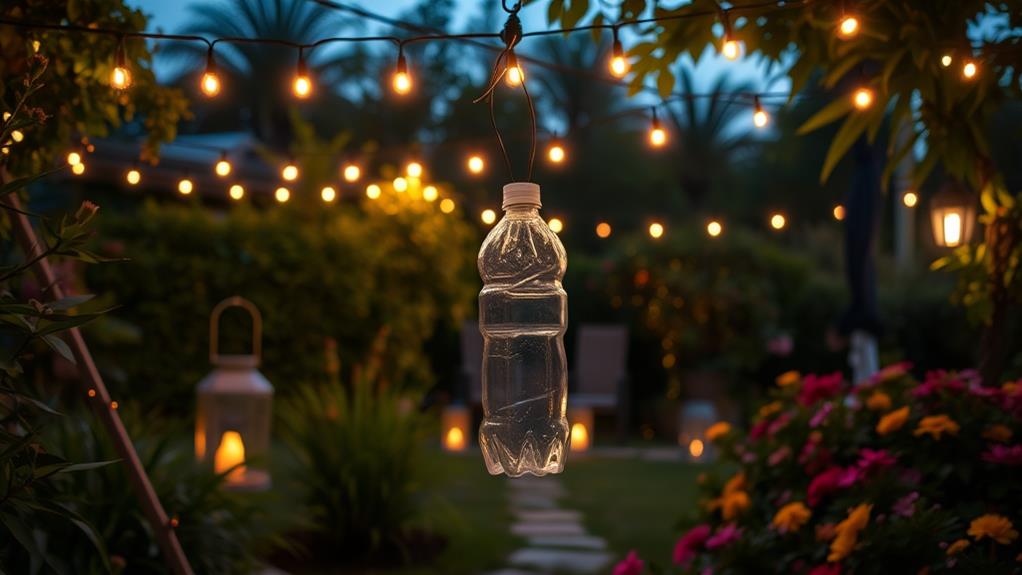
While enjoying the outdoors, it’s easy to forget about the tiny creatures that can quickly ruin the fun.
Mosquitoes can be a nuisance, but there are innovative ways to keep them at bay. Consider setting up mosquito traps in your yard to reduce their population.
- Install a mosquito trap: These traps use a combination of carbon dioxide, heat, light, and humidity to attract mosquitoes and then trap them.
- Use a fan: Mosquitoes are not strong fliers, so using a small fan can help keep them away.
- Burn citronella candles: The smoke from the candles can prevent mosquitoes from homing in on people.
- Install yellow lights: Mosquitoes are attracted to light, so using yellow bulbs can help repel them.
Planting Mosquito-Repellent Plants
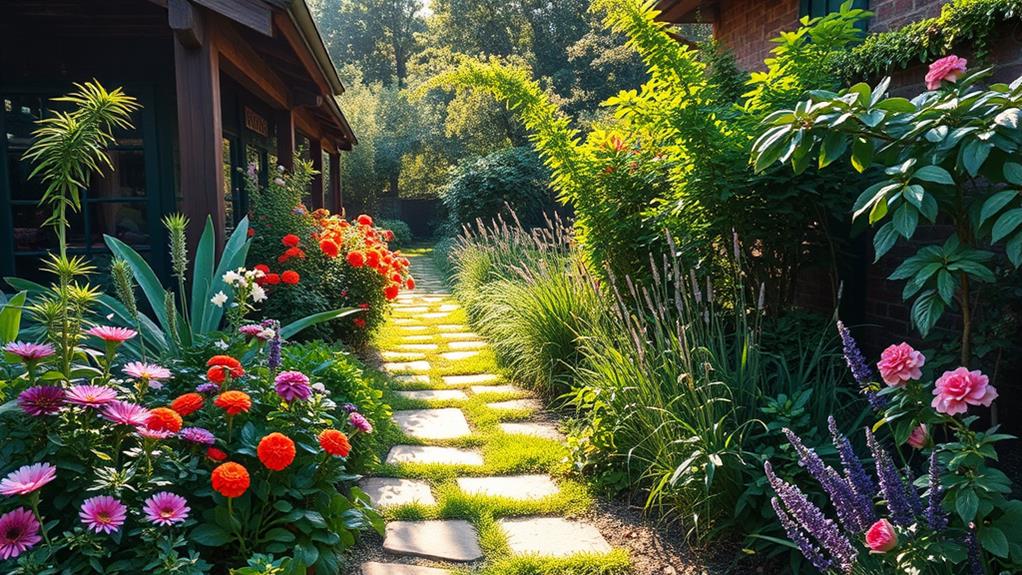
By incorporating mosquito-repellent plants into your outdoor space, you can create a natural barrier against these annoying insects.
Many plants contain essential oils that can repel mosquitoes, such as citronella, lavender, and basil. Plant these in pots to keep mosquitoes away from outdoor seating areas or create a garden of these plants in your yard to reduce mosquito populations.
Mosquito-repellent plants can in addition add beauty and fragrance to outdoor spaces. They’re a chemical-free and eco-friendly way to repel mosquitoes, making them a great option for those looking for a natural solution.
Garlic as a Natural Insect Repellent
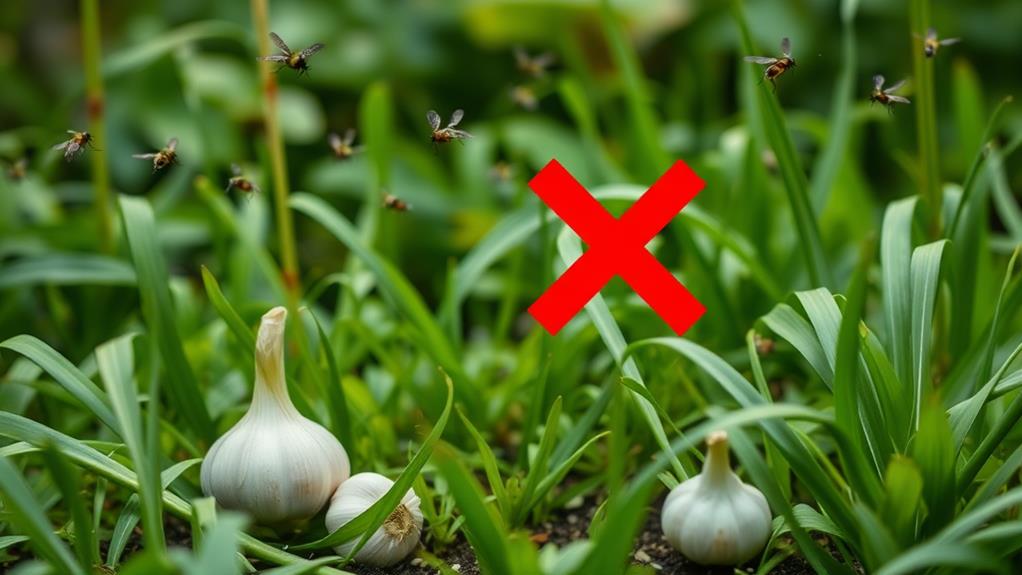
Garlic’s pungent aroma is notorious for warding off vampires in folklore, but did you know it too has a real-life reputation for repelling mosquitoes and other insects?
This natural insect repellent can be used in various ways to keep mosquitoes at bay.
- Eat garlic as part of your diet to repel mosquitoes and other insects.
- Make a garlic spray by soaking garlic cloves in vegetable oil for 24 hours, then straining the oil and mixing it with lemon juice.
- Add garlic to your lotion or cream for an extra layer of protection.
- Use garlic-infused candles or essential oils to repel mosquitoes in outdoor areas.
Eliminate Standing Water and Breeding Sites
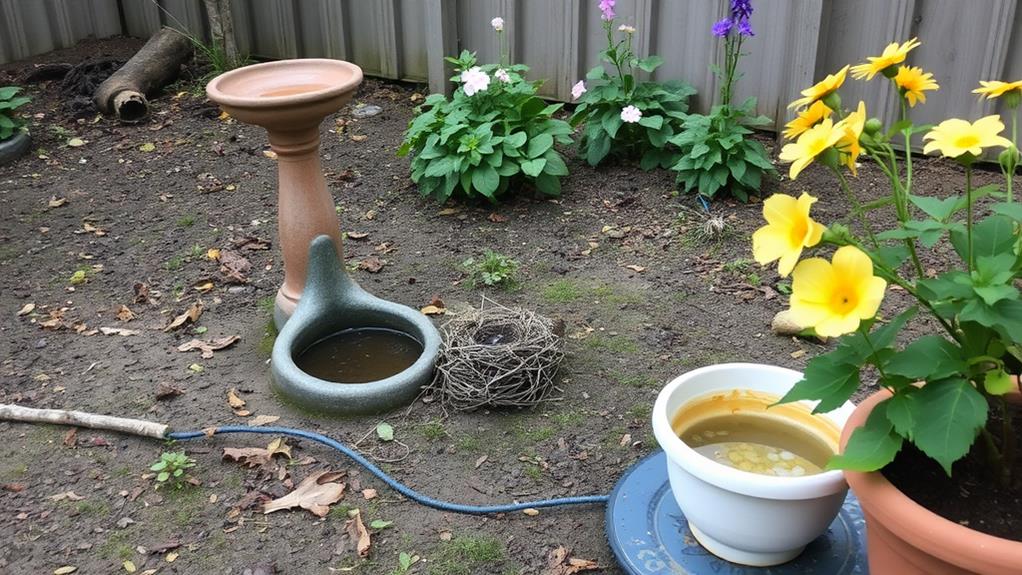
In the unyielding pursuit of a mosquito-free life, one essential aspect often gets overlooked: eliminating standing water and breeding sites.
Mosquitoes need water to lay their eggs, so removing any standing water from your property is pivotal. Check your yard for areas where water may be collecting, such as pet dishes, bird baths, and kiddie pools.
Regularly clean and disinfect these areas to prevent mosquitoes from breeding. Additionally, keep your doors and windows closed, or install screens to prevent mosquitoes from entering your home.
Conclusion
Mosquito repellent strategies encompass a range of creative and effective methods. From employing fans and citronella candles to utilizing essential oils and garlic, various approaches can be examined. Additionally, eliminating standing water and breeding sites is vital in preventing mosquito infestations. By adopting these innovative techniques, individuals can enjoy outdoor spaces while minimizing the nuisance of mosquitoes.

